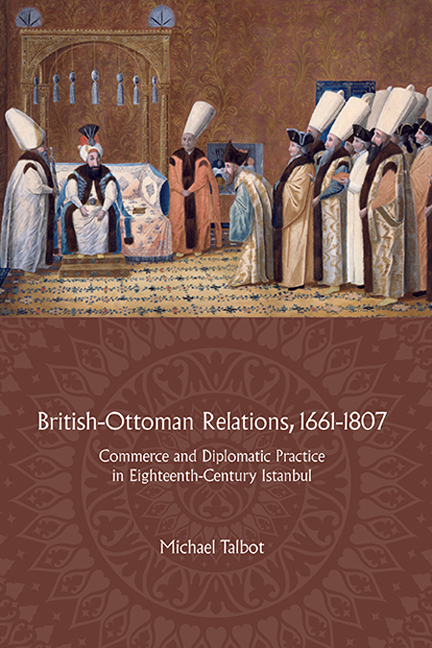 British-Ottoman Relations, 1661-1807
British-Ottoman Relations, 1661-1807 Book contents
- Frontmatter
- Dedication
- Contents
- List of tables and figures
- Acknowledgements
- Note on languages, place names, dates, and currencies
- List of abbreviations
- Introduction: De/re-constructing the history of British–Ottoman relations
- 1 The framework of relations
- 2 The office of ambassador
- 3 Trade and diplomatic finances
- 4 Gift-giving
- 5 Diplomacy as performance
- 6 Negotiating disputes
- Conclusions: De/re-constructing British–Ottoman diplomacy
- Bibliography
- Index
1 - The framework of relations
Published online by Cambridge University Press: 29 July 2017
- Frontmatter
- Dedication
- Contents
- List of tables and figures
- Acknowledgements
- Note on languages, place names, dates, and currencies
- List of abbreviations
- Introduction: De/re-constructing the history of British–Ottoman relations
- 1 The framework of relations
- 2 The office of ambassador
- 3 Trade and diplomatic finances
- 4 Gift-giving
- 5 Diplomacy as performance
- 6 Negotiating disputes
- Conclusions: De/re-constructing British–Ottoman diplomacy
- Bibliography
- Index
Summary
The development of British–Ottoman relations
Just as the story of British ambassadors in the Ottoman Empire began with a sea voyage, so too did the story of Ottoman ambassadors in London. The nineteenth-century historian Ahmed Cevdet recorded that, ‘in the first days of the year [12]07 [1792/3], [Yusuf] Agah Efendi, having been prepared to make his departure, chartered a ship and was dispatched by sea to Britain in order to [present] the imperial gifts’. This was a far more momentous journey than may first appear. The majority of this study presents British–Ottoman relations through the prism of the British embassy in Istanbul, as for most of the period under consideration relations were not bilateral in the sense of an equal Ottoman representation in London. However, as part of a series of reforms of the Ottoman state during the reign of Selim III, collectively known as the ‘New Order’ (Niẓām-ı Cedīd), the Ottoman state began to dispatch resident ambassadors to foreign courts, as opposed to the temporary messengers they had sent up to that time. The first resident ambassador to be sent abroad – Yusuf Agah Efendi – went to London, and this marked a substantial change in the nature of relations.
Why did the Ottomans, after hundreds of years, suddenly decide to employ resident ambassadors? Ahmed Cevdet concluded that the dispatch of these new resident ambassadors was due to increasing political uncertainty in Europe, relating that ‘as all the states of Europe were obliged to make cautious preparations with the onset of the French Revolution, so too did the Sublime State prepare to send ambassadors to reside at each of the great European states, each with the appropriate rank for the said states’. And why was London the first destination? Ahmed Cevdet explained that, as an old ally, France would have been the obvious first choice, but the turmoil of revolution ruled it out, along with many other European powers. Therefore, although London was the first destination for an Ottoman resident ambassador, this was not necessarily a comment on the political importance of a British alliance to Istanbul. France, although it had been at times a temperamental ally, and even at times an open enemy, had in the past been a key friend in Europe.
- Type
- Chapter
- Information
- British-Ottoman Relations, 1661-1807Commerce and Diplomatic Practice in Eighteenth-Century Istanbul, pp. 17 - 42Publisher: Boydell & BrewerPrint publication year: 2017


